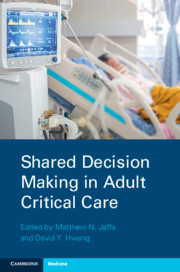Book contents
- Shared Decision Making in Adult Critical Care
- Shared Decision Making in Adult Critical Care
- Copyright page
- Dedication
- Contents
- Contributors
- Preface
- Chapter 1 When Does Shared Decision-Making Apply in Adult Critical Care?
- Chapter 2 How Much Does the Family Want to Be Involved in Decision-Making?
- Chapter 3 Show Me the Data
- Chapter 4 Communication Skills for Critical Care Family Meetings
- Chapter 5 The Do-Not-Resuscitate Order
- Chapter 6 The Do-Not-Intubate Order
- Chapter 7 Prolonged Ventilator Dependence for the Pulmonary Patient
- Chapter 8 Renal Replacement Therapy
- Chapter 9 Shared Decision-Making during Extracorporeal Membrane Oxygenation
- Chapter 10 Hypoxic–Ischemic Brain Injury after Cardiac Arrest
- Chapter 11 Decompressive Craniectomy for Stroke Patients
- Chapter 12 Decompressive Craniectomy for Traumatic Brain Injury Patients
- Chapter 13 Severe Traumatic Spinal Cord Injury
- Chapter 14 Potentially Inappropriate Treatment and Conscientious Objection
- Chapter 15 Shared Decision-Making in Emergent Situations
- Chapter 16 Advance Directives
- Chapter 17 Care of the Unbefriended Patient
- Chapter 18 The Role of Palliative Care in the Intensive Care Unit
- Chapter 19 Measuring and Evaluating Shared Decision-Making in the Intensive Care Unit
- Chapter 20 Brain Death Discussions
- Index
- References
Chapter 19 - Measuring and Evaluating Shared Decision-Making in the Intensive Care Unit
Published online by Cambridge University Press: 27 May 2021
- Shared Decision Making in Adult Critical Care
- Shared Decision Making in Adult Critical Care
- Copyright page
- Dedication
- Contents
- Contributors
- Preface
- Chapter 1 When Does Shared Decision-Making Apply in Adult Critical Care?
- Chapter 2 How Much Does the Family Want to Be Involved in Decision-Making?
- Chapter 3 Show Me the Data
- Chapter 4 Communication Skills for Critical Care Family Meetings
- Chapter 5 The Do-Not-Resuscitate Order
- Chapter 6 The Do-Not-Intubate Order
- Chapter 7 Prolonged Ventilator Dependence for the Pulmonary Patient
- Chapter 8 Renal Replacement Therapy
- Chapter 9 Shared Decision-Making during Extracorporeal Membrane Oxygenation
- Chapter 10 Hypoxic–Ischemic Brain Injury after Cardiac Arrest
- Chapter 11 Decompressive Craniectomy for Stroke Patients
- Chapter 12 Decompressive Craniectomy for Traumatic Brain Injury Patients
- Chapter 13 Severe Traumatic Spinal Cord Injury
- Chapter 14 Potentially Inappropriate Treatment and Conscientious Objection
- Chapter 15 Shared Decision-Making in Emergent Situations
- Chapter 16 Advance Directives
- Chapter 17 Care of the Unbefriended Patient
- Chapter 18 The Role of Palliative Care in the Intensive Care Unit
- Chapter 19 Measuring and Evaluating Shared Decision-Making in the Intensive Care Unit
- Chapter 20 Brain Death Discussions
- Index
- References
Summary
Shared experiences are inherently challenging to measure and evaluate, and shared decision-making (SDM) in the context of critical illness is no exception. The shared nature of a decision is an abstract idea, or latent construct. Declaring a specific decision to have been shared requires knowing how multiple parties viewed their roles in this complex process. As a result, there are few validated instruments that have been successfully used to measure SDM in the intensive care unit (ICU) setting.
- Type
- Chapter
- Information
- Shared Decision Making in Adult Critical Care , pp. 167 - 178Publisher: Cambridge University PressPrint publication year: 2021



